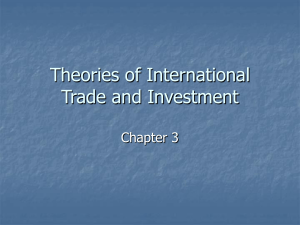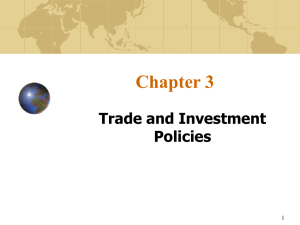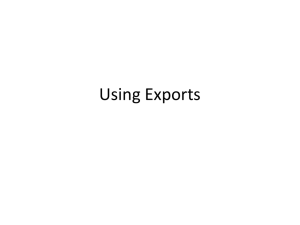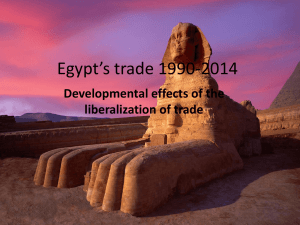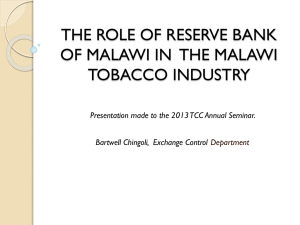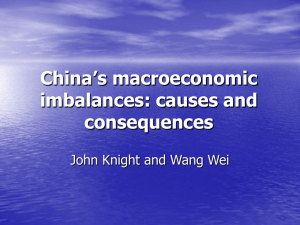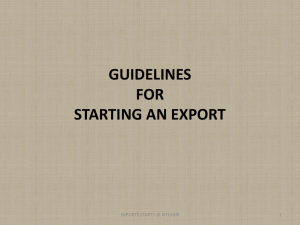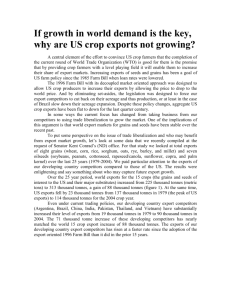WHAT IS INTERNATIONAL BUSINESS
advertisement
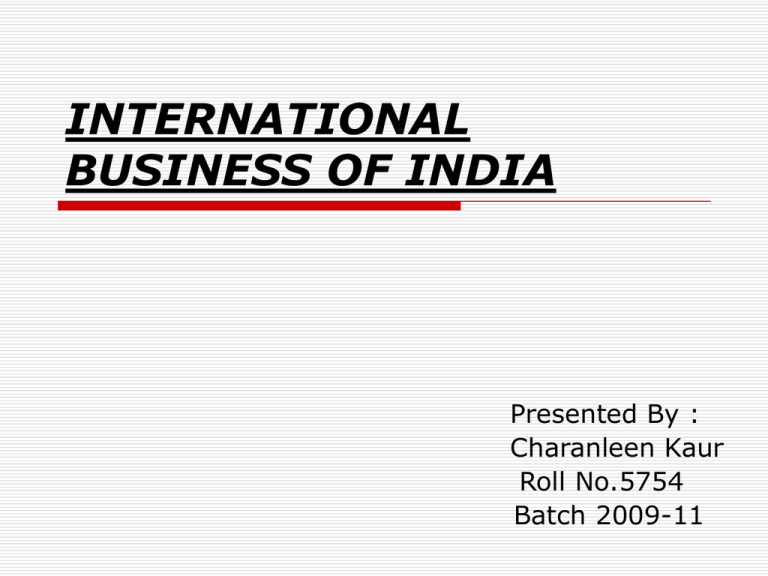
INTERNATIONAL BUSINESS OF INDIA Presented By : Charanleen Kaur Roll No.5754 Batch 2009-11 WHAT IS INTERNATIONAL BUSINESS International business means carrying on business activities beyond national boundaries. These activities normally include transaction of economic resources international production foreign investment especially, foreign direct investment NEED OF INTERNATIONAL BUSINESS To import the goods that are not produced domestically To export the goods that are produced over and above the domestic requirements To encourage foreign direct investment to build the resource gap Micro-economic level importance INDIA AND GLOBAL TRADE India had a significant share in the world trade at the time of independence. However, since then there was a regular decline in India’s share in the world exports till 1980. From 1950 to 1980 the percentage declined from 2 to 0.4. It, how ever improved to about 0.8 by 1997. It reached 0.83% in 2003 and rose to 1.45% in 2008. The break-up of foreign trade in terms of exports & imports (Rs.crores) Year 1995-96 1996-97 1997-98 1998-99 2002-03 2003-04 2004-05 2005-06 Export 106353 85623 126286 101850 255137 291582 356625 456418 Import 122678 97111 151553 132447 297206 353976 481950 660408 BOT -16325 -1488 -25267 -25267 -42067 -62394 -125190 -203990 Exports as a % 0f National Income YEAR IN % 1960-61 6.8 1970-71 3.8 1980-81 5.4 1990-91 7.2 1996-97 9.6 1997-98 8.4 1998-99 8.0 1999-00 8.5 2000-01 8.8 2001-02 8.7 2002-03 9.0 2007-08 17 EXPORT STRATEGY Imports will increase and to finance them , we need higher exports earning. It is not advisable to depend on external assistance to finance imports. Debt-servicing burden is ever mounting, necessitating increased export earning. FOREIGN TRADE POLICY (2004-09) OBJECTIVES (i) to double our percentage share of global merchandize trade within 5 years (ii) to use trade expansion as an effective instrument of economic growth and employment generation. ACHIEVEMENTS OF FOREIGN TRADE POLICY (2004-09) Looking back, we can say with satisfaction that the UPA Government has delivered on its promise. In the last five years ; our exports witnessed robust growth to reach a level of US$ 168 billion in 2008-09 from US$ 63 billion in 200304. Our share of global merchandise trade was 0.83% in 2003; it rose to 1.45% in 2008 as per WTO estimates. On the employment front, studies have suggested that nearly 14 million jobs as a result of augmented exports in the last five years. Export By Region ( in Rs.Crores) Share – 52% Growth – 29% 400000 350000 300000 250000 200000 Apr-Feb 2008 Apr-Feb 2009 150000 100000 50000 0 Europe Africa America Asia & ASEAN CIS & Baltics Other Region Import By Region (In Rs.Crores) Share – 61% Growth – 36% 800000 700000 600000 500000 400000 Apr-Feb 2008 Apr-Feb 2009 300000 200000 100000 0 Europe Africa America Asia & ASEANH CIS & Baltics Other Region Top Five Commodities of Export Growth – 87% 120000 100000 80000 60000 Apr-Feb 2008 Apr-Feb 2009 40000 20000 0 Petroleum Gems & Transport Machinery Drugs & Jewellery Equipment & Chemicals Instruments Top Five Commodities of Import Growth – 38% 400000 350000 Growth – 99% 300000 250000 200000 Apr-Feb 2008 Apr-Feb 2009 150000 100000 50000 0 Petroleum Electronic Machinery Products Goods except Electronic Gold Pearls FTP (2009 – 2014) The short term objective of current FTP is : To arrest and reverse the declining trend of exports and to provide additional support especially to those sectors which have been hit badly by recession. The government is likely to set a policy objective of achieving an annual export growth of 15% with an annual export target of US$ 200 billion by March 2011. In the remaining three years of this FTP i.e. upto 2014, the country should be able to come back on the high export growth path of around 25% p.a. By 2014, the govt. expects to double India’s exports. SPECIAL FOCUS INITIATIVES With a view to continuously increasing our percentage share of global trade and expanding employment opportunities , 13 special focus initiatives have been identified. Government of India shall make concerted efforts to promote exports in these sectors. These sectors are… (1) Market Diversification In this policy, focus is on diversification of Indian exports to other markets, specially those located in Latin America, Africa, parts of Asia and Oceania. The initiatives taken under this policy are.. 26 new countries have been included under Focus Market Scheme. (2) Technological Upgradation Such initiatives include : EPCG Scheme at zero duty has been introduced for certain engineering, electronic products, plastics, handicrafts, etc. To encourage value added manufacture export, a minimum 15% value addition on imported inputs has been stipulated. A number of products including automobiles have been included for incentives under Focus Product Scheme. (3) Support To Status Holders The Government recognized ‘Status Holders’ contribute approx. 60% of India’s goods exports. To incentivise and encourage the status holders, additional duty credit scrip @ 1 % of the FOB of past export shall be granted for specified product groups. (4) Agriculture and Village Industry Vishesh Krishi and Gram Udyog Yojana Import of inputs such as pesticides are permitted for agro exports. New towns of export excellence with a threshold limit of Rs 150 crore shall be notified. (5) Handlooms Specific funds are earmarked under MAI / MDA Scheme for promoting handloom exports. Duty free import of old pieces of hand knotted carpets on for re-export after repair is permitted. New towns of export excellence with a threshold limit of Rs 150 crore shall be notified. (6) Handicrafts Specific funds are earmarked under MAI / MDA Scheme for promoting handicraft exports. New towns of export excellence with a threshold limit of Rs 150 crore shall be notified. (7) Gems and Jewellery Import of gold of 8 k and above is allowed subject to import being accompanied by an Assay Certificate specifying purity, weight and alloy content. Duty free import entitlement of commercial samples shall be Rs. 300,000. Import of Diamonds for Certification/ Grading & re-export by the authorized offices/agencies of Gemological Institute of America (GIA) in India or other approved agencies will be permitted. (8) Leather and Footwear Duty free import entitlement of specified items is 3% of FOB value of exports of leather garments during preceding financial year. Re-export of unsuitable imported materials such as raw hides & skins and wet blue leathers is permitted. (9) Marine Sector Imports for technological upgradation under EPCG in fisheries sector (except fishing trawlers, ships, boats and other similar items) exempted from maintaining average export obligation. (10) Electronics and IT Hardware Manufacturing Industries Expeditious clearance of approvals required from DGFT shall be ensured. Exporters /Associations would be entitled to utilize MAI & MDA Schemes for promoting Electronics and IT Hardware Manufacturing industry exports. (11) Sports Goods and Toys Sports goods and toys shall be treated as a Priority sector under MDA / MAI Scheme. Applications relating to Sports Goods and Toys shall be considered for fast track clearance by DGFT. (12) Green Products and Technologies India aims to become a hub for production and export of green products and technologies. To achieve this objective, special initiative will be taken to promote development and manufacture of such products and technologies for exports. To begin with, focus would be on items relating to transportation, solar and wind power generation and other products. (13) Incentives for Exports from the North Eastern Region In order to give a fillip to exports of products from the north-eastern States, notified products of this region would be incentivized . Conclusion International Business plays a crucial role in the economic development of a nation as it leads to industrialization, employment and reduction of scarcity of consumer goods. Our share of world trade has significantly increased over the years. At present, International Business opportunity in India exists in areas like IT, Telecom, R&D, Infrastructure, Retailing, etc. Sectors like health, education, housing, water resources, SMEs are untapped and offer huge scope.
